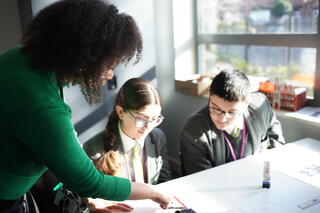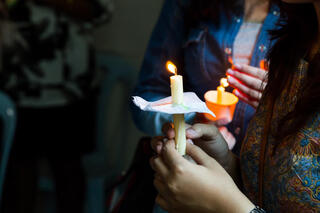The civil unrest, racism and violence that began after three girls were murdered in Southport has impacted many communities around the UK, fostering divisions and making individuals feel unsafe in the place they call home. That the acts of violence were met by counter protests, legal recriminations and acts of upstanding, in which community members turned out en masse to support those targeted highlights the supportive undercurrent present in UK society.
However, there is work to be done to try to heal over the societal divisions thrown into relief and/or caused by the riots, and to allow people to come together to understand their common humanity. This work is particularly important in schools as classrooms may contain individuals who participated in the rioting, or who are acquainted with those who did, as well as individuals targeted by the violence. Creating a classroom community in which the tumultuous events can be unpacked, understood and processed is vital to foster cohesion.
Moreover, the fact the rioting was triggered by the spread of false information on social media platforms, much of which was rooted in xenophobia and Islamophobia, highlights the need for young people to develop media literacy skills in order to avoid being manipulated by information they encounter online.
Facing History UK has several resources that can help teachers support their students in developing media literacy skills and countering the identity-based hate that fuelled the summer violence.
To support your students to develop as critical and empathetic consumers, creators and sharers of information, use our unit ‘Developing Media Literacy for Well-being, Relationships and Democracy’.

Developing Media Literacy for Well-being, Relationships and Democracy
Teach students about media literacy, helping them develop as critical consumers and creators of information, in order to support their well-being, their relationships and our democracy.
This ten-lesson unit helps students:
- Reflect on the changing media and information landscape;
- Understand how this landscape impacts individuals, communities and society;
- Consider how they can thoughtfully and responsibly engage with content they encounter online and in print.
Lessons cover a range of topics including bias and representation in the media, the impact of social media on individuals and society, how to identify and respond to misinformation, disinformation and mal-information, how to avoid being drawn to conspiracy theories and extremism, and how to stay safe online.
The unit helps students become conscientious content creators and consumers, who feel empowered to assess information themselves, and trust in their capacity to discern what is true from what is not. This can enhance their decision-making skills and help them grow as effective problem-solvers, who can reflect on societal issues and how best to respond to them. Media literacy skills can nurture student well-being, their relationships and our democracy.
To help counter the anti-Muslim, anti-Islamic and anti-migrant sentiment that threatened communities around the UK, we recommend using our unit ‘Discussing Contemporary Islamophobia in the Classroom’.

Discussing Contemporary Islamophobia in the Classroom
This unit is designed to help students in the UK reflect on how Islamophobia manifests in contemporary society and what needs to be done to challenge it.
The five-lesson unit helps students reflect on Islamophobia – how it manifests in contemporary society and its impact – and consider what needs to be done to challenge it. The lessons explore topics such as:
- The history of Islamophobia;
- Islamophobic tropes;
- Islamophobia in the media;
- Gendered Islamophobia;
- How to stand up against this form of racial and religious hatred.

Teaching in the Wake of Violence (UK)
This lesson contains strategies and activities for supporting your students in the aftermath of violent events in which people are targeted because of aspects of their identity.
Finally, our lesson ‘Teaching in the Wake of Violence’ can help teachers to navigate conversations with their students after violent attacks. While such conversations are difficult, they are important as when we don’t address the violence in the classroom, we risk normalising it.




